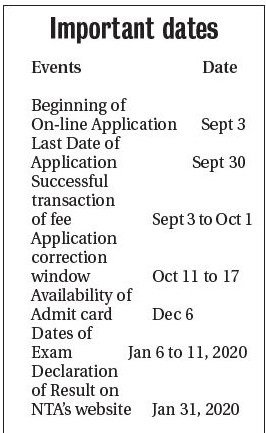JEE Main 2020 Paper Pattern Revamped:Now JEE (Main) will have 3 papers, changed pattern for B planning course, Check Details About Integer-Type Questions
The National Testing Agency (NTA) has revamped the question paper pattern for the Engineering Joint Entrance Examination.
There will be many major changes in the JEE (Main) examination to be held in January next year. Registrations for JEE (Main) January 2020 have started from 3 September. This examination is going to be seen in January 2020 this time. Recently it was announced that this time in the exam, students will face fewer questions in Physics (Physics), Chemistry (Chemistry) and Mathematics (Mathematics).
As per the revamped JEE exam structure, from now on, there will be 25 questions in each paper (mathematics, physics and chemistry) with 20 multiple-choice questions (MCQ) and five in the integer-type format. Earlier, students had to answer 30 MCQs each. Questions in the drawing paper have been reduced from three to two. There will be an aptitude test of 50 marks.
The first edition of JEE (Main) 2020 will be conducted from January 6 to January 11 and the second JEE (Main) will be held from April 3 to April 9.

Most students are happy with the change as the number of questions has decreased, however, they are divided on the right approach to continue their practice as just three months is left for the first round of examinations in January.
What are the integer-type questions?
Integer-type questions are the ones where the answer is an integer. Unlike the Multiple Choice Questions (MCQs) where the students need to select one of the provided options for a given question, the integer-type questions do not have any options. The only clue is that the answer should be an integer. The answer depends on what approximations are taken to solve the question. Hence, students need to be very careful while solving these type of questions.
Teachers View
Some teachers believe that the introduction of the integer-type questions will end all guesswork and test the true merit of a student. Finding the answer for these type of questions will need precision and practice, which will help the meritorious students stand out. Using the elimination method to approach a question will also now be discouraged, helping the students actually understand the subject for excelling in it.
Advise for students
Students are advised to not panic with this sudden change in the exam pattern. This change might work in their favour. The lesser number of questions means more time to spend on the integers. So, even if the question is of a higher difficulty level, students can easily solve the questions if they have prepared well before the exam.
Preparation Tips
To master integer-based questions, students should attempt sample tests or mock test with all the possible kinds of questions in the integer type segment.
With regular practice of integer-type questions, the students will be able to tackle questions in the JEE exams with ease and confidence.
Source – TOI


Connect with us